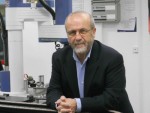Prof. Zvi Shiller in the RAV Lab. (photo from israel21c.org)
Within a few years, you may be traveling in a car with nobody at the wheel. Whether you call it an autonomous, driverless or self-driving vehicle, this automobile of the near future needs a host of complex components, some now under development at Israeli companies and academic laboratories.
“You will be able to go to, let’s say, Paris or Tokyo, rent a car, swipe a card and tell it where you want it to go. You won’t have to know the area or the traffic rules,” explained Prof. Zvi Shiller, founder of the department of mechanical engineering and mechatronics at Ariel University and director of its Paslin Laboratory for Robotics and Autonomous Vehicles (RAV Lab).
The biggest benefit will be fewer traffic accidents than we have today – which cause more than 30,000 casualties annually in the United States alone – by eliminating human error in driving. But that requires a very, very smart car.
In the RAV Lab, Shiller and his students are developing algorithms that will automatically modulate speed and handling in response to constantly changing, unpredictable road conditions. Driverless cars will need this capability to meet future safety regulations.
“Today’s driverless cars, introduced by leading car companies such as Ford, Volvo and even Google, can drive very well on a road that is smooth and flat. Our research is about driving over a surface with bumps, ruts and hills,” said Shiller. “This is much more difficult because you can easily lose stability on that kind of terrain. If you’re driving too fast over a bump, you may jump into the air. You have to know at which speed you can drive safely without losing contact with the ground. You may need off-road driving capabilities less than 10% of the time, but you can’t trust a car that cannot handle those 10%.”
The current research continues Shiller’s work at the University of California-Los Angeles Laboratory for Robotics and Automation, which he founded and headed for 14 years before joining Ariel University in 2001.
At the RAV Lab, Shiller and his students have developed a small mobile robot that manoeuvres between obstacles at high speed, showing how the driverless car would handle itself.
“I haven’t seen a similar robot moving as fast,” said Shiller. “This stems from our ability to compute the optimal velocity that exploits the robot’s motion capabilities.”
A couple of years ago, the lab published their results from testing a simple version of this algorithm against one developed at the Massachusetts Institute of Technology, where Shiller earned graduate degrees in mechanical engineering.
“Our algorithm computes a collision-free path among 70 tightly spaced obstacles in half a millisecond, compared to 500 milliseconds (0.5 seconds) it took the algorithm from MIT,” he reported. “That’s 1,000 times faster!”
RAV Lab’s technology could be one of a few systems for driverless cars to come out of Israel. The different systems address everything from motion planning to cyber-security.
Among the companies working on self-driving car technologies is Jerusalem-based Mobileye, whose driver-assistance software is already built into approximately 3.3 million vehicles worldwide. Mobileye reportedly is collaborating with American electric car manufacturer Tesla on developing its driverless vehicle.
Shiller said that one of the most difficult functions to automate is the 3-D mapping system to take the place of human perception in identifying and avoiding moving and stationary hazards in the car’s vicinity.
“Researchers are still working on this,” he said. “Once we map the region around the vehicle, we can use this information to do the next part, which is planning the vehicle’s motion. That’s where my research comes in.”
Making life easier
Over the years, Shiller’s students have produced robots that climb stairs, clean windows, operate wheelchair lifts, dispense pills, push baby strollers uphill, turn pages and accomplish other everyday tasks. They’ve built up a portfolio of almost 90 robotic products over the last 10 years to solve daily life problems in a futuristic way. “Some of these are world firsts,” said Shiller.
The RAV Lab’s research has been supported by Israel’s ministries of science, transportation and defence, the Israeli Space Agency, General Motors and the Paslin Foundation.
As head of the Israeli Robotics Association (IROB), Shiller is optimistic that Israel can become a world leader in smart robotics.
“Quite a few of the Israeli robotics companies are world leaders in their fields,” he said, citing examples such as Robomow, the Dolphin swimming pool cleaner, the SpineAssist surgical device, Mobileye and the ReWalk exoskeleton.
“The research we do in Israel is state of the art,” said Shiller. “I believe that if we build upon the infrastructure developed over the last 25 years in the remarkable Israeli high-tech industry, we can become world leaders in robotics as well.”
For more information, visit ariel.ac.il/sites/shiller/ravlab.
Israel21C is a nonprofit educational foundation with a mission to focus media and public attention on the 21st-century Israel that exists beyond the conflict. For more, or to donate, visit israel21c.org.

